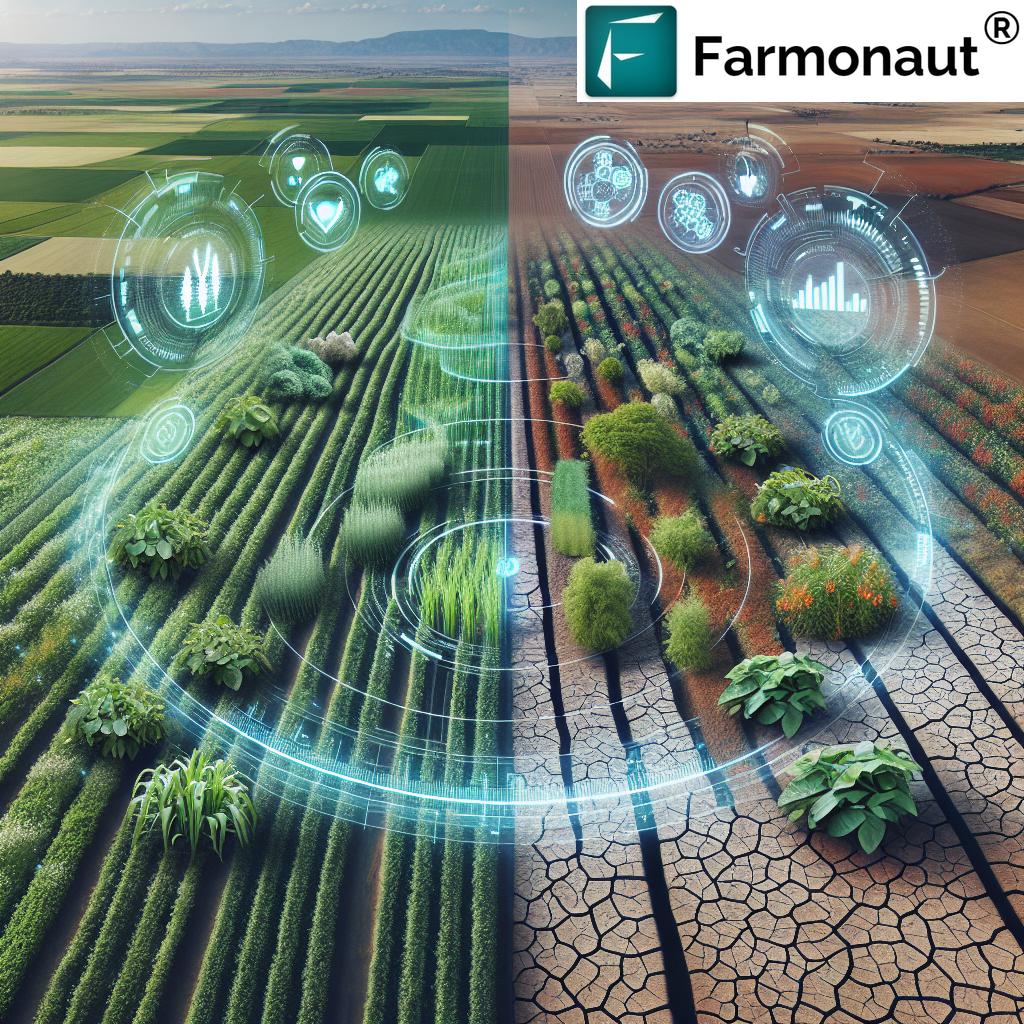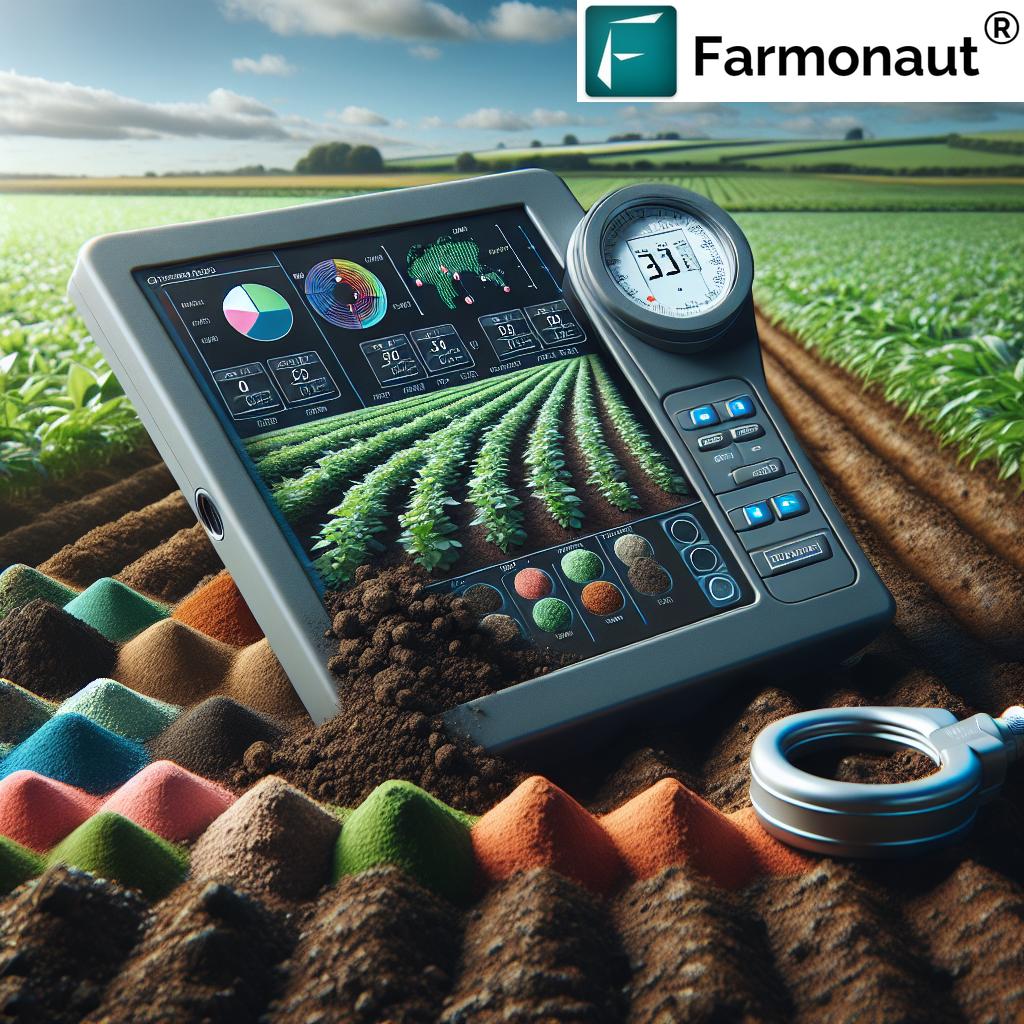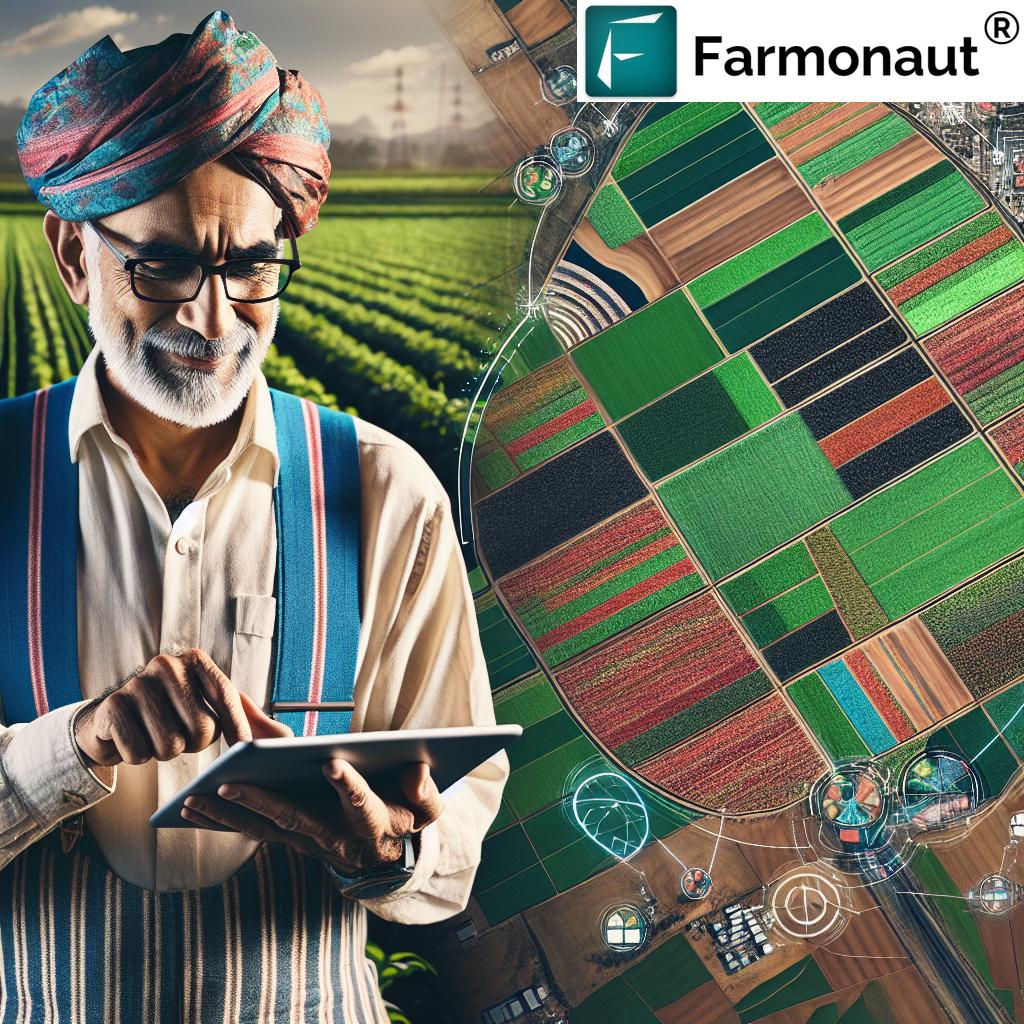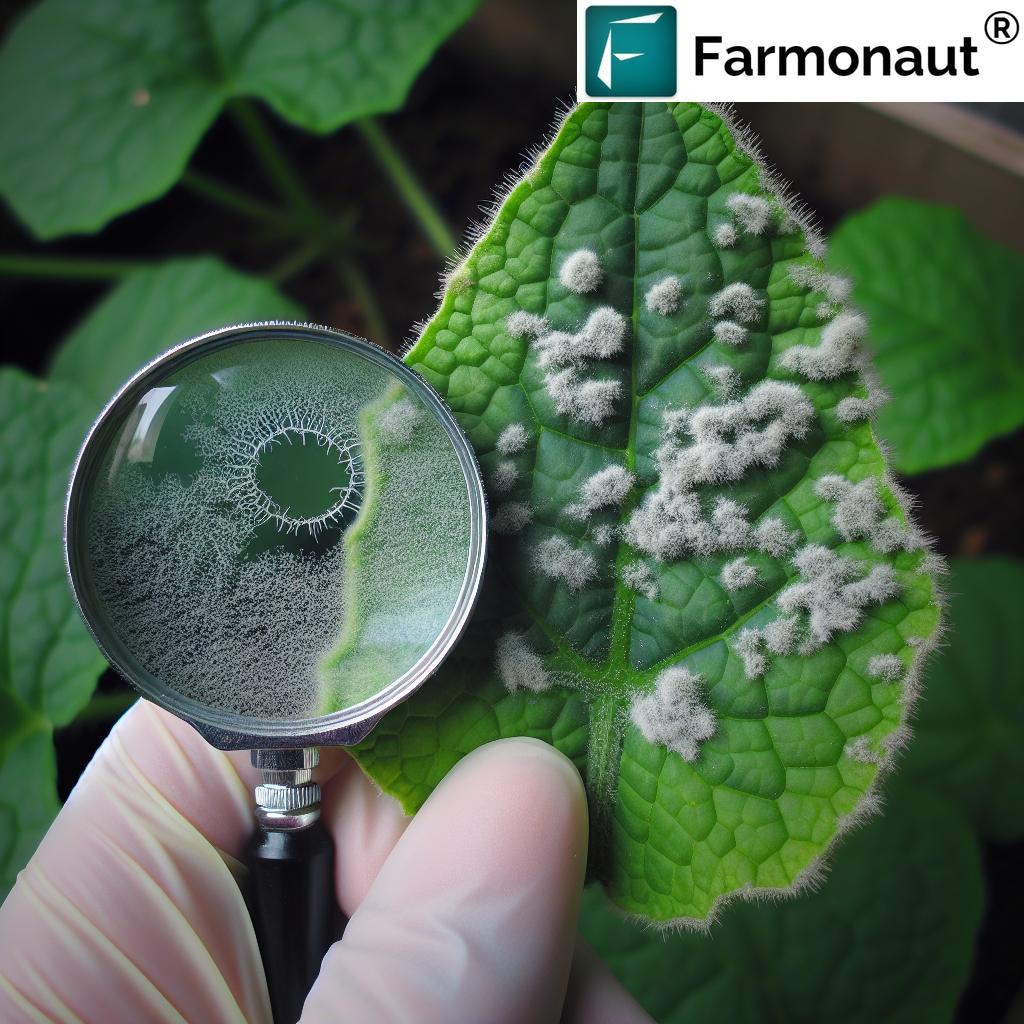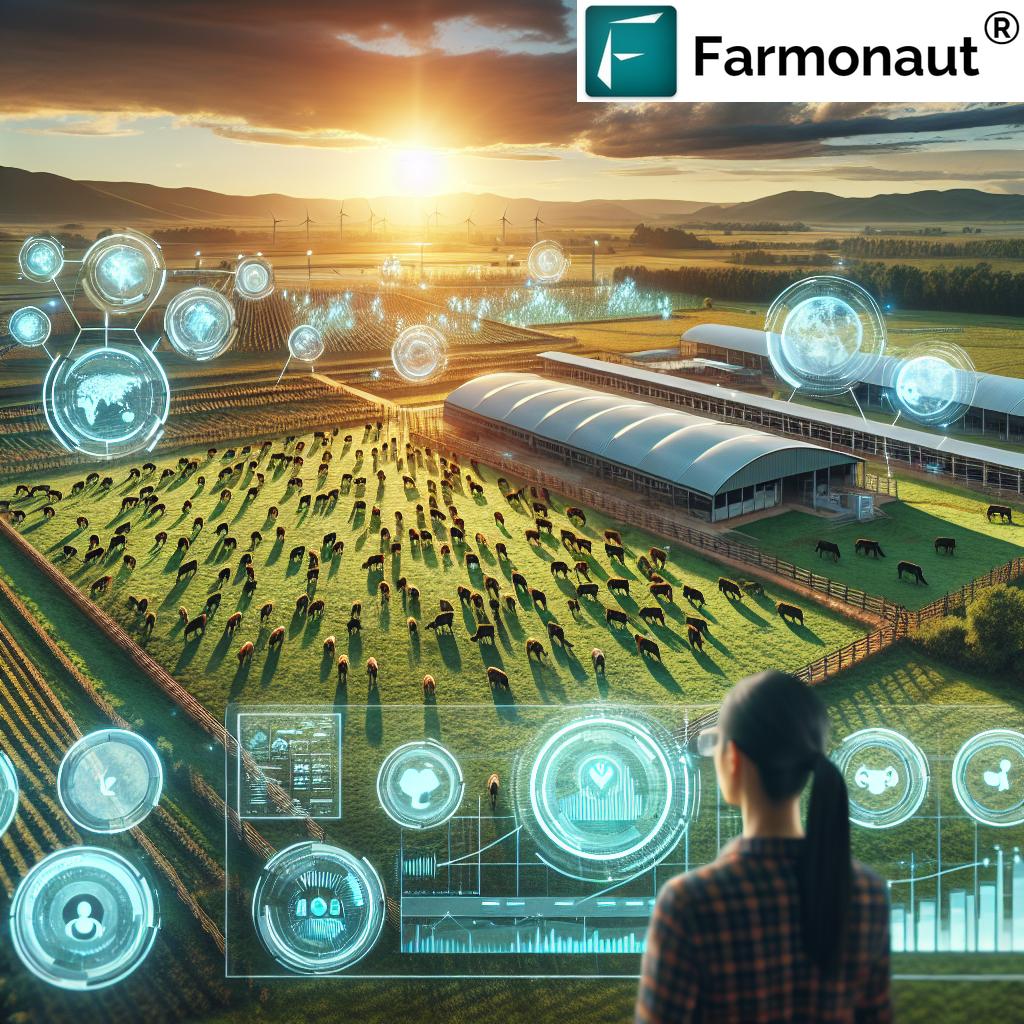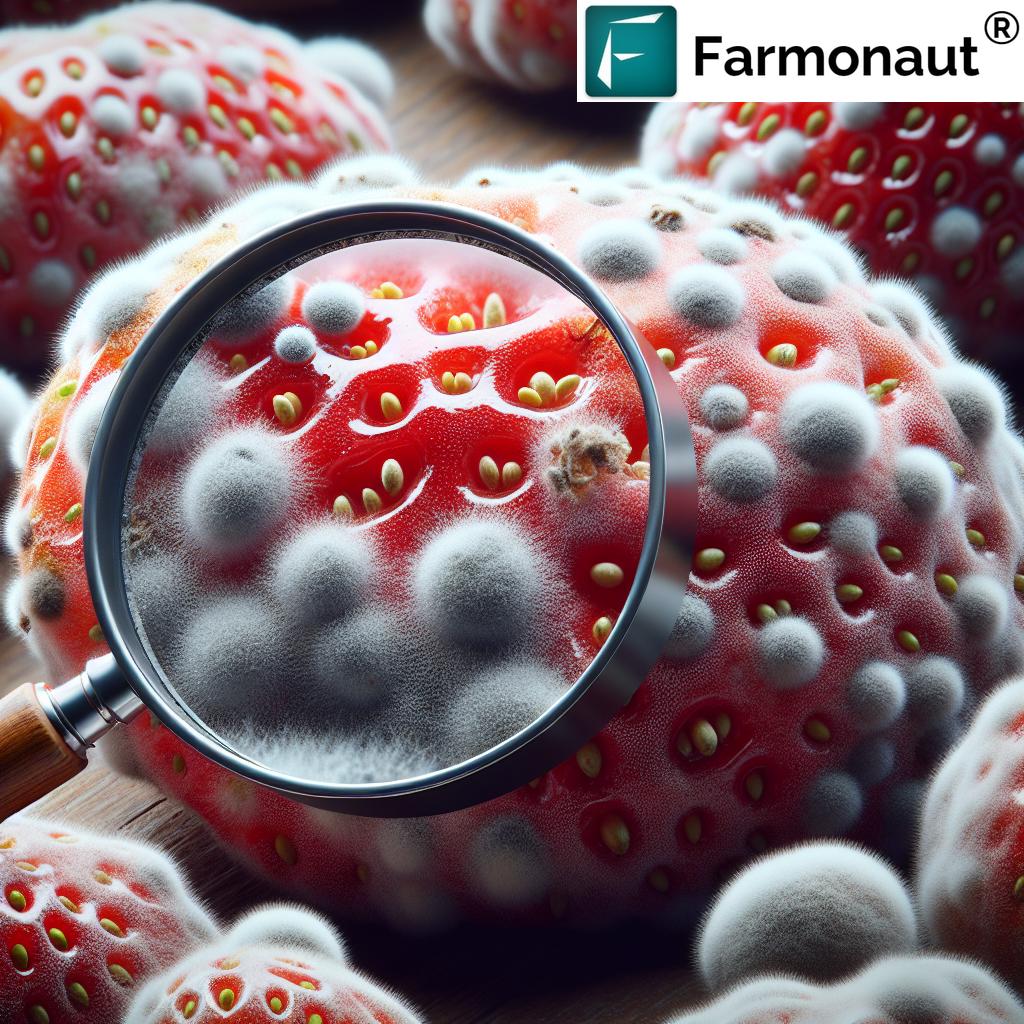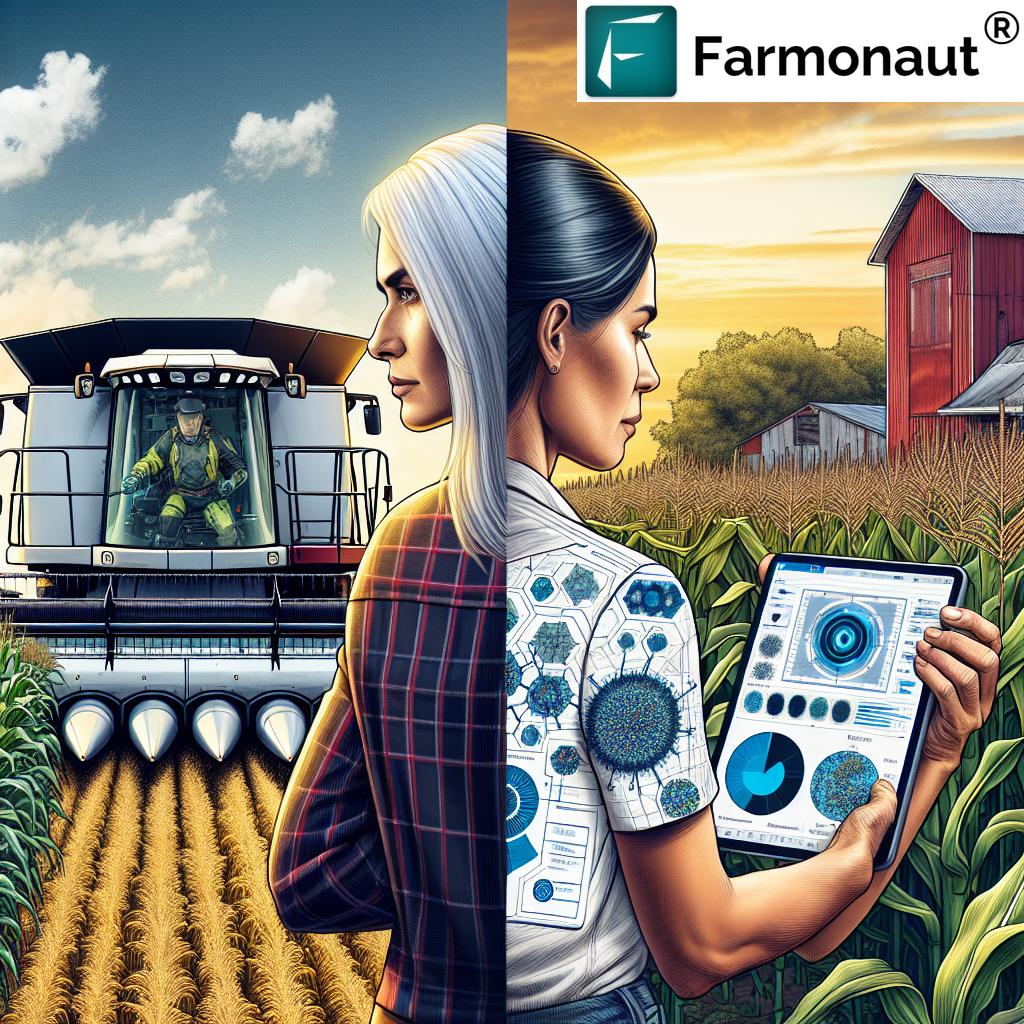Leveraging Precision Agriculture Data: Navigating Supply Chain Challenges in Russia’s Chemical Industry
“Precision agriculture data can influence up to 80% of decisions in crop nutrition management and yield optimization.”
In an era of unprecedented geopolitical tensions and evolving agricultural landscapes, we at Farmonaut find ourselves at the forefront of a complex intersection between agricultural chemical suppliers, fertilizer production technology, and precision agriculture data. Recent events have shed light on the intricate web connecting civilian chemical production to military efforts, highlighting the dual-use nature of essential agricultural inputs. As we navigate these turbulent waters, it’s crucial to examine how these developments impact sustainable farming practices and smart farming solutions in the context of global supply chain challenges.
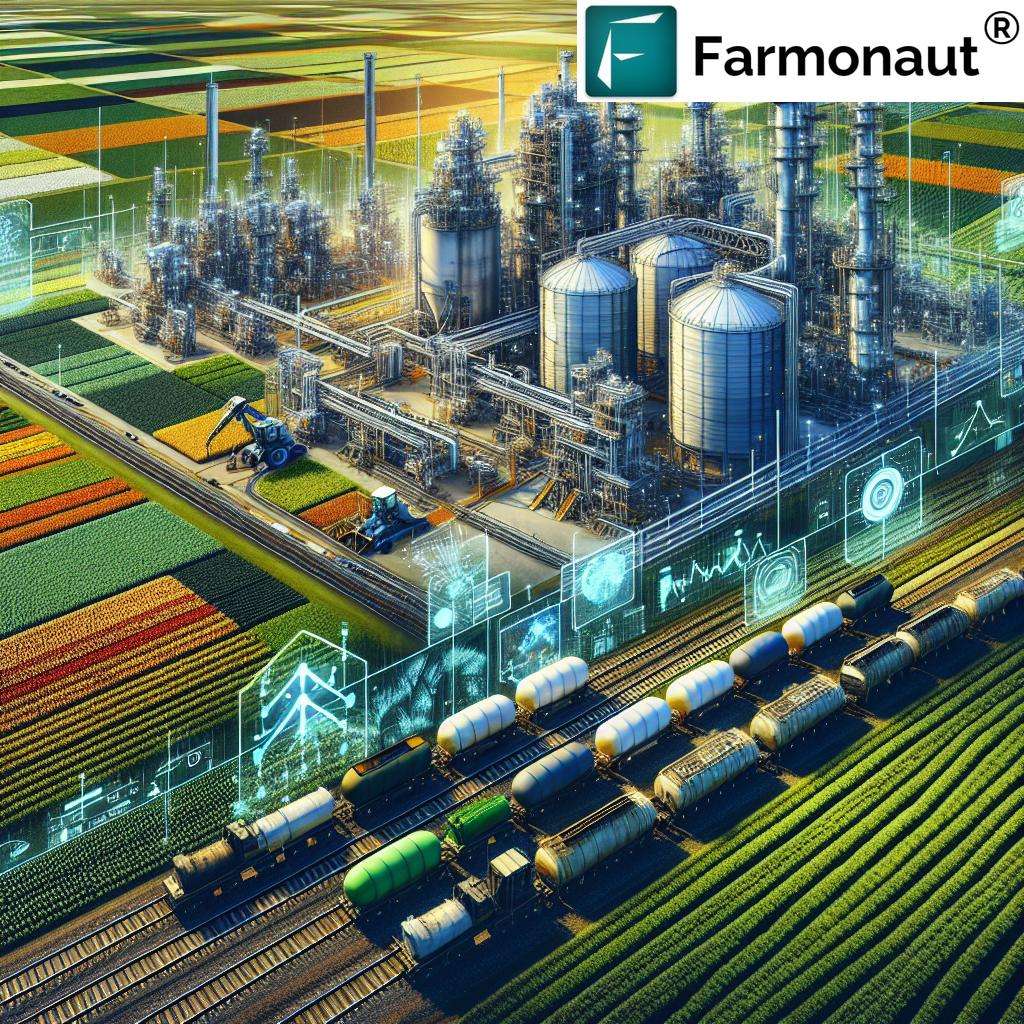
The Dual-Use Dilemma: Civilian Production and Military Application
Recent analysis by Reuters has unveiled a startling reality: several chemical companies owned or founded by wealthy Russian businessmen are inadvertently contributing to Moscow’s military efforts in Ukraine. These firms, while primarily focused on civilian chemical production, are supplying essential chemicals that find their way into explosives production. This revelation stems from an extensive examination of railway and financial data, tracking shipments from the onset of the war in February 2022 through September 2023.
The investigation identifies five firms, linked to billionaires under Western sanctions, which have provided over 75% of the critical chemical ingredients transported to major explosives factories in Russia. Among the implicated are Roman Abramovich, former owner of Chelsea Football Club, and Vagit Alekperov, one of Russia’s wealthiest individuals. While these businessmen and their associated companies assert that they only supply chemicals for civilian purposes, the dual-use nature of these products presents a complex challenge for global agricultural supply chain management.
The Role of Precision Agriculture in Mitigating Supply Chain Disruptions
In light of these developments, the importance of precision agriculture data and smart farming solutions cannot be overstated. At Farmonaut, we leverage advanced agricultural satellite imaging and soil health monitoring techniques to provide valuable insights into crop nutrition management and yield optimization strategies. Our platform offers:
- Real-time crop health monitoring using multispectral satellite imagery
- AI-driven personalized farm advisory through our Jeevn AI system
- Blockchain-based traceability solutions for supply chain transparency
- Resource management tools for efficient agricultural operations
By harnessing these technologies, we aim to help farmers and agribusinesses navigate the challenges posed by supply chain disruptions and geopolitical tensions.
Explore our precision agriculture solutions:
The Impact on Global Food Security
The intertwining of civilian chemical production with military applications raises critical concerns about global food security. As sanctions targeting Russian billionaires and their associated companies continue to evolve, there’s a potential for significant disruptions in the agricultural chemical supply chain. This situation underscores the need for adaptive crop yield optimization techniques and sustainable farming practices.
To illustrate the potential impact, let’s examine a comprehensive overview of how geopolitical tensions affect various aspects of the agricultural chemical supply chain:
| Chemical Name | Primary Use in Agriculture | Major Producing Countries | Estimated Global Production (million tons) | Estimated Price Change (%) | Impact on Crop Yields (%) | Alternative Sources/Solutions |
|---|---|---|---|---|---|---|
| Nitrogen fertilizers | Crop nutrition | China, Russia, USA | 150 | +25% | -10% to -15% | Organic fertilizers, crop rotation |
| Phosphate fertilizers | Root development | China, Morocco, USA | 45 | +15% | -5% to -10% | Rock phosphate, bone meal |
| Potash fertilizers | Yield and quality improvement | Canada, Russia, Belarus | 40 | +30% | -8% to -12% | Wood ash, seaweed |
| Pesticides | Pest control | China, USA, Germany | 3.5 | +10% | -20% to -30% (if unavailable) | Integrated pest management, biopesticides |
| Herbicides | Weed control | China, USA, Japan | 2.5 | +12% | -15% to -25% (if unavailable) | Mechanical weeding, cover crops |
This table highlights the intricate relationships between chemical production, agricultural inputs, and global events. It’s clear that disruptions in the supply chain of these essential chemicals can have far-reaching consequences for crop yields and food security worldwide.
Sustainable Farming Practices: A Path Forward
In the face of these challenges, sustainable farming practices emerge as a critical component of future agricultural strategies. At Farmonaut, we advocate for and support the implementation of:
- Precision fertilizer application based on real-time soil health data
- Integrated pest management using satellite-derived vegetation health indices
- Water conservation through advanced soil moisture monitoring
- Crop diversification and rotation informed by historical yield data
These practices not only reduce reliance on potentially scarce chemical inputs but also contribute to long-term soil health and environmental sustainability.
The Role of Agricultural Satellite Imaging in Supply Chain Resilience
Agricultural satellite imaging plays a pivotal role in building resilience against supply chain disruptions. By providing accurate, timely data on crop health, soil conditions, and weather patterns, satellite technology enables farmers and agribusinesses to make informed decisions that optimize resource use and mitigate risks.
Farmonaut’s satellite-based solutions offer:
- Early detection of crop stress, allowing for targeted interventions
- Accurate yield predictions to inform supply chain planning
- Monitoring of large-scale agricultural operations for efficient resource allocation
- Data-driven insights for precision agriculture and smart farming practices
Interested in leveraging satellite data for your agricultural operations? Explore our API solutions:
Navigating Regulatory Challenges in the Agricultural Chemical Industry
The recent revelations about the dual-use nature of agricultural chemicals have prompted discussions about reevaluating current sanctions and regulatory frameworks. As the situation evolves, it’s crucial for stakeholders in the agricultural sector to stay informed and adapt their strategies accordingly.
Key considerations include:
- Monitoring changes in international regulations affecting chemical imports and exports
- Developing contingency plans for potential supply chain disruptions
- Exploring alternative sources for essential agricultural inputs
- Investing in research and development of sustainable agricultural technologies
“Dual-use agricultural chemicals account for approximately 60% of civilian fertilizer production technology applications.”
The Future of Agtech: Adapting to a Changing Landscape
As we navigate these complex challenges, the agtech sector is poised for significant growth and innovation. The need for more resilient, sustainable, and efficient agricultural practices is driving advancements in:
- AI-powered crop management systems
- Blockchain technology for supply chain transparency
- Precision agriculture tools for resource optimization
- Alternative and bio-based agricultural inputs
At Farmonaut, we’re committed to staying at the forefront of these developments, continuously enhancing our platform to meet the evolving needs of farmers and agribusinesses worldwide.
Empowering Farmers with Data-Driven Insights
In times of uncertainty, access to accurate, timely information becomes more critical than ever. Farmonaut’s platform empowers farmers and agribusinesses with:
- Real-time crop health monitoring using NDVI and other vegetation indices
- Customized crop management recommendations based on AI analysis
- Weather forecasting and alerts for proactive decision-making
- Historical data analysis for long-term planning and optimization
By leveraging these insights, agricultural stakeholders can make informed decisions that mitigate risks and optimize resource use, even in the face of supply chain challenges.
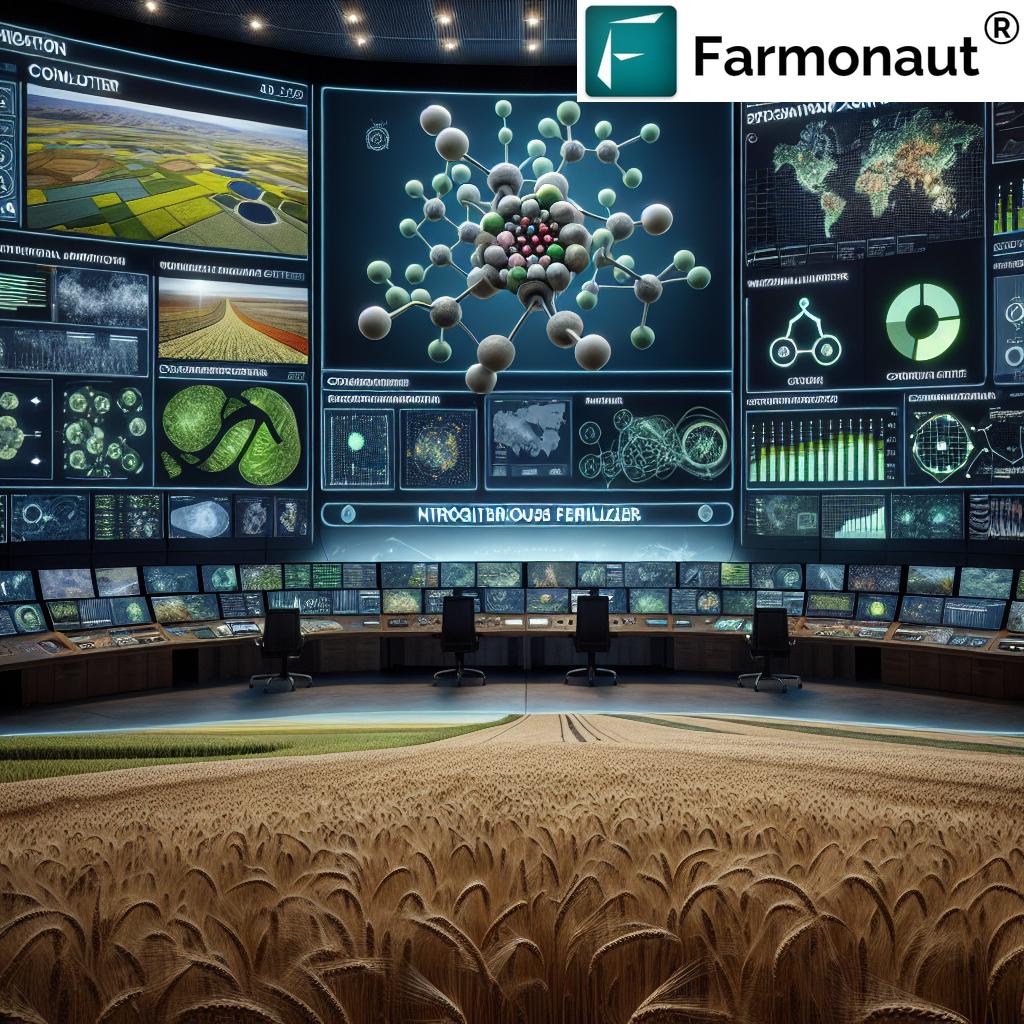
Building Resilient Agricultural Supply Chains
The current geopolitical situation underscores the importance of building resilient agricultural supply chains. Key strategies include:
- Diversifying sourcing of agricultural inputs
- Implementing traceability systems for enhanced transparency
- Adopting circular economy principles in agricultural production
- Fostering collaboration between stakeholders across the supply chain
Farmonaut’s blockchain-based traceability solutions play a crucial role in enhancing supply chain transparency and building trust among stakeholders.
The Role of Artificial Intelligence in Adapting to Supply Chain Challenges
Artificial Intelligence (AI) is playing an increasingly important role in helping the agricultural sector adapt to supply chain challenges. Farmonaut’s AI-powered solutions offer:
- Predictive analytics for crop yield and market demand
- Automated detection of crop diseases and pest infestations
- Optimization of resource allocation based on real-time data
- Personalized recommendations for crop management strategies
By harnessing the power of AI, we’re helping farmers and agribusinesses make data-driven decisions that enhance productivity and resilience in the face of uncertainty.
Looking Ahead: The Future of Global Agriculture
As we navigate the complex interplay of geopolitical tensions, supply chain challenges, and technological advancements, the future of global agriculture is both challenging and promising. Key trends to watch include:
- Increased adoption of precision agriculture and smart farming technologies
- Growing emphasis on sustainable and regenerative farming practices
- Development of alternative, bio-based agricultural inputs
- Enhanced collaboration between technology providers, farmers, and policymakers
At Farmonaut, we remain committed to driving innovation in the agtech sector, empowering farmers with the tools and insights they need to thrive in an ever-changing global landscape.
Farmonaut Subscription Options
Frequently Asked Questions
Q: How does precision agriculture data help in navigating supply chain challenges?
A: Precision agriculture data provides real-time insights into crop health, soil conditions, and resource utilization. This information allows farmers and agribusinesses to optimize their operations, reduce waste, and make informed decisions about resource allocation, helping to mitigate the impact of supply chain disruptions.
Q: What role does satellite imaging play in modern agriculture?
A: Satellite imaging is crucial for monitoring large-scale agricultural operations, providing data on crop health, soil moisture, and weather patterns. This technology enables early detection of crop stress, accurate yield predictions, and efficient resource management, all of which contribute to more resilient agricultural practices.
Q: How can farmers adapt to potential shortages in agricultural chemicals?
A: Farmers can adapt by implementing sustainable farming practices such as precision fertilizer application, integrated pest management, and crop diversification. Additionally, exploring alternative, bio-based inputs and leveraging data-driven insights for optimal resource use can help mitigate the impact of chemical shortages.
Q: What are the implications of dual-use chemicals for the agricultural sector?
A: The dual-use nature of many agricultural chemicals complicates supply chains and regulatory environments. It may lead to increased scrutiny, potential supply disruptions, and the need for alternative sourcing strategies. This situation underscores the importance of transparency, traceability, and diversification in agricultural supply chains.
Q: How is AI transforming agriculture in the context of supply chain challenges?
A: AI is revolutionizing agriculture by providing predictive analytics, automated disease detection, and personalized crop management recommendations. These capabilities help farmers and agribusinesses optimize their operations, make data-driven decisions, and build more resilient supply chains in the face of global challenges.
In conclusion, as we navigate the complex landscape of global agriculture amidst geopolitical tensions and supply chain challenges, the role of precision agriculture data and smart farming solutions becomes increasingly crucial. At Farmonaut, we remain dedicated to providing innovative, accessible technologies that empower farmers and agribusinesses to thrive in this ever-changing environment. By leveraging advanced satellite imaging, AI-driven insights, and blockchain-based traceability, we’re helping to build a more resilient, sustainable, and productive agricultural sector for the future.





